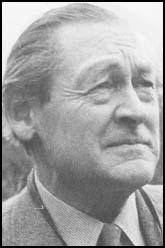Martin Furnival Jones

Martin Furnival Jones was born in 1913. A former solicitor he joined MI5 in 1937. After the Second World War he became head of C Branch and therefore responsible for security.
In January 1964 Arthur Martin interviewed Michael Straight, an American who had studied at Trinity College, Cambridge. While at university he became friends with Kim Philby, Donald Maclean, Guy Burgess and Anthony Blunt. Straight claimed that Blunt had tried to recruit him to become a Soviet spy.
Arthur Martin and Jim Skardon had interviewed Blunt eleven times since 1951. Martin, now armed with Straight's story, went to see Blunt again. This time he made a confession. He admitted being a Soviet agent and named John Cairncross, Peter Ashby, Brian Symon and Leo Long as spies he had recruited.
Martin was disappointed when it was discovered that Roger Hollis and the British government had decided not to put Anthony Blunt on trial. Martin once again began to argue that there was still a Soviet spy working at the centre of MI5. Martin convinced Furnival Jones and along with Peter Wright went to see Dick White, head of MI6. They told White that they were convinced that either Hollis or his deputy, Graham Mitchell, were Soviet agents.
White contacted Hollis and it was agreed that Mitchell should be kept under constant surveillance. Furnival Jones carried out the investigation but no evidence was found and he was officially cleared of being a spy.
When Roger Hollis retired as Director-General in 1965 and was replaced by Furnival Jones. After receiving representations from Peter Wright and Arthur Martin, Furnival Jones interrogated Hollis in 1969. Like Mitchell before him, Hollis was eventually cleared of being a Soviet mole.
Furnival Jones held the post of Director General of MI5 until he retired in 1972.
Martin Furnival Jones died in 1997.
Primary Sources
(1) Peter Wright, Spycatcher (1987)
Furnival Jones was a lawyer by training, who joined MI5 during the war. On the surface he seemed an orthodox, taciturn man, lacking flair and vigor. But Furnival Jones was easy to underestimate. He had an officer's gift for leadership, and a logical, ordered mind which was surprisingly open to new ideas. But most of all, he possessed a streak of determination, if not ruthlessness, which made him a superb head of counterespionage. He realized that the main problem facing MI5 was the sheer scale of Soviet Bloc intelligence activity in Britain. Dl, for instance, had the task of monitoring and working against around 300 Russian intelligence officers. Its total staff was eleven, of whom four were secretaries. We were swamped, never knowing whether we were chasing spies or shadows.
